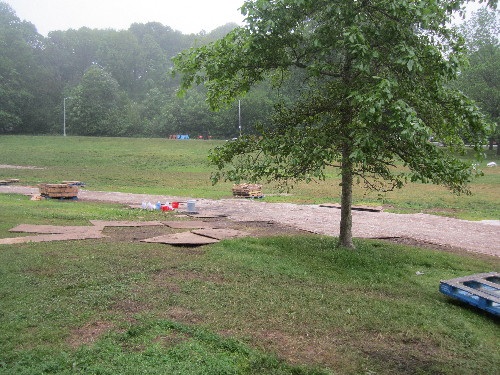Do Our Parks Need GoogaMoogas?

- Anne-Katrin Titze
- Is the only way to save the park to destroy it?
The Prospect Park Alliance planned to net $75,000 from the Great GoogaMooga, the music-and-food festival that recently took over (and seriously damaged) the park’s Nethermead. Critics scoffed at such a paltry sum—critics like the Times columnist Michael Powell, who wondered “why the park gets so little for giving up so much.” Today, he answered that question: because our politicians have abandoned public parks.
“About 10 years ago, the city contributed about 60 percent of the park budget and we raised the rest,” a board member of the Prospect Park Alliance, a nonprofit formed in the 80s and charged with maintaining the park, told the Times. Today, that figure is at 40 percent. “The Alliance scrapes up the rest from corporations and foundations and by insistently shaking a tin cup before city and state legislators,” Powell writes—and from events like GoogaMooga.
As parks go, Prospect Park does well for itself, though the Alliance board member said: “Prospect Park is not even close to Central Park… It’s golden apples and regular oranges.” Parks like Central Park and the High Line do considerably better, using their high-profile status to attract wealthy benefactors, thus creating a parks divide in the city not unlike the one with public schools: the richer you are, the better public services you have.
But their seems something fundamentally wrong about not evenly distributing the quality of public goods throughout the city. Over the weekend, Brooklyn State Senator Daniel Squadron, in an op-ed in the Times, suggested well-off conservancies start sharing their wealth with the city’s underfunded parks. He proposed “the creation of a Neighborhood Parks Alliance, which would form partnerships between a well-financed conservancy, a ‘contributing park’ and ‘member parks’ in need of more money and support… Consider that the Central Park Conservancy”—that park’s equivalent of the Prospect Park Alliance—”has an annual budget for park expenses of nearly $40 million. Twenty percent of that—$8 million—would go a long way for a whole lot of smaller parks.”
It doesn’t sound like a bad idea, although who knows if the billionaires who live around Central Park would close their checkbooks at the idea of some playground in the South Bronx getting some of their money. But we should also recognize that this weird public-private management of parks isn’t the best way to assure access to quality open spaces and greenspaces for New Yorkers. Imagine this: what if our politicians fairly funded our parks and stopped acting as though they don’t have an impact on the health of a city? “It’s that old notion of the public weal,” Powell writes—an old notion increasingly disregarded in Bloomberg’s privatized city.
Speaking of the mayor, “his foundation informed the Prospect Park Alliance that it intended to end its quarter-million dollar annual contribution.”
Follow Henry Stewart on Twitter @henrycstewart
You might also like 




















